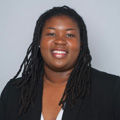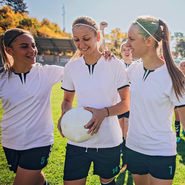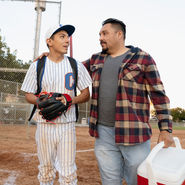Olympic gold medalist and sports broadcaster Cat Whitehill will be inducted into the Athletes in Action Hall of Faith at the 12th Annual Night of Champions Saturday night. The 10-year veteran of the US Women’s Soccer Team and former North Carolina Tar Heel will be awarded along with two-time Heisman winner and Ohio State legend, Archie Griffin.
This interview has been edited and condensed for clarity.
AIA: You’ve been a high achiever at every level of the soccer game. From high school championships and national titles at The University of North Carolina to the ultimate—becoming a gold medalist in the 2004 Olympic Games. What’s your definition of success?
CW: The awards are very special obviously, but success is just what I’ve learned from the teams that I’ve all played on because they’ve all been different and seeing how that has built my life. I’m proud of who I am now as a person. I don’t let the awards define my success.
Through every tough time that I’ve gone through I feel like I’ve come out a better person and I think that is what’s more important than the gold medal because that’s just sitting on my dresser somewhere and I have to still live my life.
AIA: What the lowest moment in your career and what gospel truth helped you in that time?
CW: I think I’ve had a few. Probably everybody can say that. I think for me the turning point in my life was when I went to North Carolina. I was a highly-touted freshman, I was told I was going to start, I was promised a bunch of things and when I got there, I thought I was fit, but I wasn’t North Carolina-fit. I didn’t pass the fitness test. I was part of the dreaded breakfast club where you’re on the track at 6AM where you’re not using a ball, you’re just running. It was tough.
I could’ve easily quit, but even in high school my favorite verse was James 1:4 where it talks about perseverance and I kept a hold of that. You have to persevere to find out who you truly are in the harder moments. So I decided I wasn’t going to quit, I wanted to be better, I got fit. At that point I wasn’t starting or playing at the position I was recruited for, but I kept working hard and didn’t make any drama of it even as disappointed as I was.
Thankfully the Lord allowed my first-ever start to be in the [2000] National Championship game where I scored the game-winning goal and won defensive MVP and that was the first game I played at my position. I think that was a turning point for me as a woman and a soccer player and it really helped to strengthen my faith.
AIA: What do you find most rewarding about the work you do now?
CW: I got the coaching bug when I got the assistant coaching job with the [Boston] Breakers. I really enjoy being around strong women and empowering them and not allowing for one coach’s decision to keep them down because I know how hard that can be.
We need more strong, confident women out there. There’s so many pressures on us. Men may have them, but I don’t think sometimes they register them as deeply as women do because we’re very emotionally-based and so I think we get down on ourselves so quickly. I just want to teach women not to do that and to be strong and proud of who they are.
AIA: What do athletes need in a teammate? Who were the teammates that affected you deeply and why?
CW: I think one of the biggest characteristics of a good teammate is someone that will have your back. I’ve been on a few teams where it was so cliquey and you never felt that if you missed a play someone would still sacrifice their body to get that ball back for you because you made a mistake. We’re all going to make mistakes in the game. You need that person that’s there for you. That’s why you love soccer because it’s a team sport. You can rally around each other.
Julie Foudy was one of the greatest leaders I’ve ever had. Anson [Dorrance], my coach at North Carolina, taught me this but Julie Foudy exemplified it: Being a leader doesn't necessarily always mean fitting in. It means holding people to a higher standard and looking to the future and allowing for the women behind you to have a better playing field.
That’s something Foudy did all the time for us. She got us more pay. She went to battle for us against US Soccer with lawyers. On the field, if we didn’t do the extra effort, she called us out. She was willing to do what was right for the team. I saw mistakes there as well, but she had her beliefs and stuck to them.
AIA: Speaking of Julie, she just published a book. So did a number of your other former teammates. If you were to become an author, what story would you like to tell?
CW: It would probably be fiction. I was asked to write a short story once and it was The Adventures of Caleb and Barney, my two dogs growing up. One of my quotes was “A dog’s godda do what a dog’s godda do.” My dad used that quote on me again just because we always thought it was so hilarious.
One of the moms of a girl that I train wants me to write a book just about my life. I think only a few people would find that interesting so I think the fiction would be funny. I still love dogs so it might be about my two dogs now, Izzy and Maeby.
AIA: What’s a gospel truth that you have to remind yourself of regularly?
CW: I’ve gotten into the habit every morning when I wake up of saying “Good Morning,God,” just to be reminded of whose I am and that Jesus is in control of my life. I try to do that every morning to remind myself that it’s not about if I’m down that day or if I’m up that day or not feeling anything that day. God is in control and that’s what matters.
This is an interesting time to be living in this country and I think it’s important to remember that it’s all about Jesus. That should be the focus and that’s what matters. Doesn't matter what you believe politically, it doesn’t matter what you believe in other aspects.
It’s about Jesus and who He is and what he would want for me in my life and for us as humans. I think that’s what’s important. I want to try and bring everything back to Jesus in my life and be as close to Him as I can be even though He was perfect and I’m definitely not. You just have to look at His life and try and emulate it as close as possible.
AIA: What’s the prayer you’ve found yourself praying recently?
CW: Just to trust in His path. I’ve always been so black and white when it came to my career. Coaching is still a grey area for me because I didn’t know that’s what I wanted to do. I have to keep praying to trust God’s path for me and know that it’s the right one. I’m at that point where I’m focused on trusting His ultimate plan for me as impatient as I can be sometimes.
AIA: You’ve given the best your yourself to this game. How do you want to be a part of advancing the game? What’s your hope for how you’d like to impact the game going forward?
CW: I’d like to leave it better than I found it. One of my goals with the [National Women’s Soccer League] was that they would have a sustained league. I was able to play in the NWSL and it’s still there. I was part of the talks for pay equality and now the women are getting a little bit more [pay]. That comes from women before me and the people after me and all of us having that same vision of making sure that we leave a legacy.
This is an incredible time to be a woman’s soccer player. I wish I could be a part of it, but at least I was a part of what I’m watching now.
It’s different being a female athlete, but it’s cool. I loved being a soccer player. I love who it made me. I want every female athlete to embrace who they are and love themselves. My goal now as a coach especially is to show these women they can be whomever they want.
If you want to be a CEO, be a CEO. If you want to be a stay-at-home mom, be a stay-at-home mom. Be whatever you want to be and dream of. Don’t let anyone bring you down at any position.













